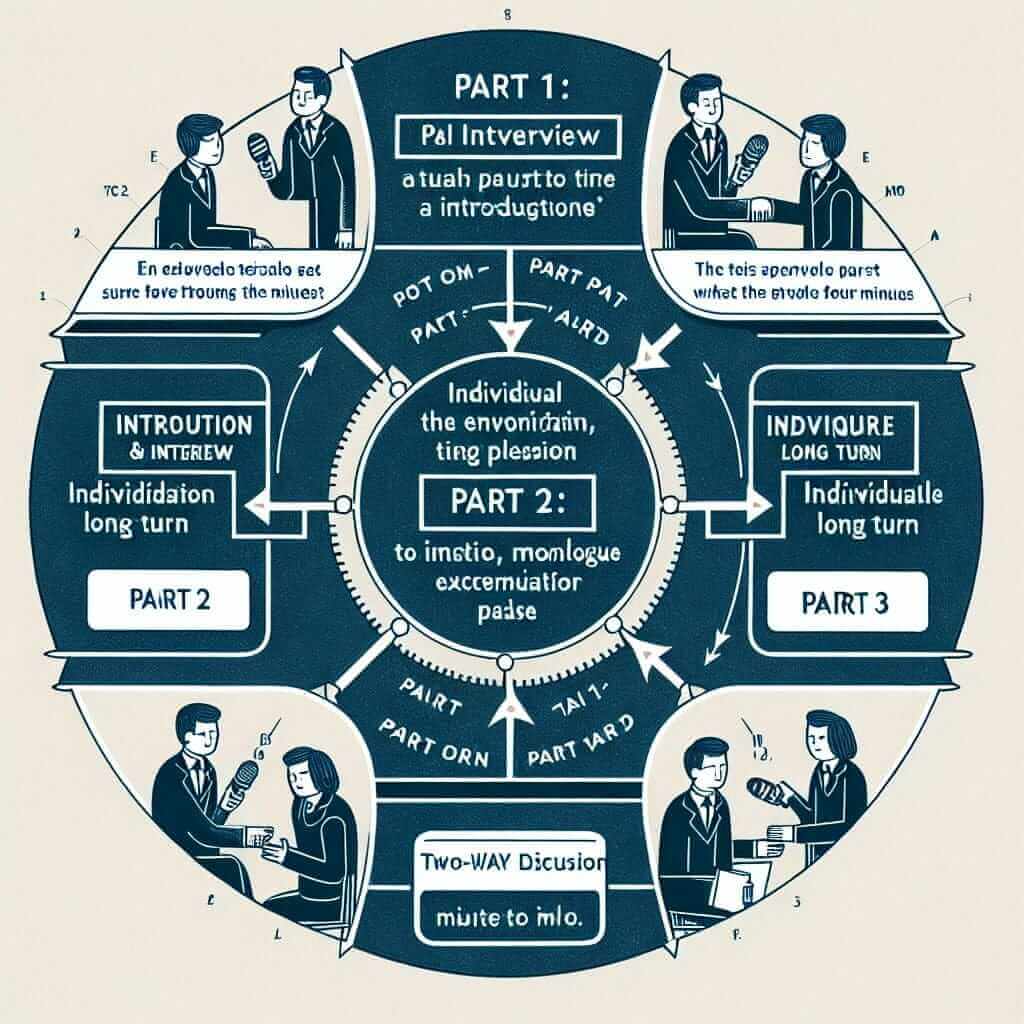The Importance of Time Management in IELTS Speaking
As an IELTS instructor with over two decades of experience, I can confidently say that time management is crucial for success in the IELTS Speaking test. It’s not just about speaking fluently; it’s about effectively conveying your ideas within the time limits. Many candidates struggle with this, often rushing towards the end or leaving questions unanswered. This is where understanding how to manage your time, using sample answers as guides, becomes invaluable.
Understanding the IELTS Speaking Test Format
The IELTS Speaking test is divided into three parts:
Part 1: Introduction and Interview (4-5 minutes)
You’ll answer questions about familiar topics like your hobbies, work, or studies.
Part 2: Individual Long Turn (3-4 minutes)
You’ll receive a cue card with a topic and points to cover. You’ll have one minute to prepare and then speak for 1-2 minutes.
Part 3: Two-Way Discussion (4-5 minutes)
You’ll engage in a deeper discussion with the examiner on topics related to Part 2.
Effective Time Management Strategies for IELTS Speaking
1. Practice with Sample Answers
One of the best ways to manage time is to practice with sample answers. This allows you to:
- Get familiar with the test format: Seeing how others structure their responses within the time limit can be incredibly helpful.
- Develop pacing: You’ll start to get a feel for how much you can comfortably say in the given time.
- Identify areas for improvement: Are you rushing? Are you leaving out key points? Analyzing sample answers can highlight areas you need to work on.
2. Structure Your Responses
Having a clear structure helps you stay on track and avoid rambling. Here’s a simple framework:
- Part 1: Provide a direct answer and then elaborate with a reason or example.
- Part 2: Use the one-minute preparation time wisely to jot down keywords. Follow the bullet points on the cue card.
- Part 3: Structure your responses like short essays – provide an opinion, support it with reasons and examples, and offer a brief conclusion.
3. Use Linking Words and Phrases
Transition words like “furthermore,” “in addition,” “however,” and “on the other hand” not only make your speech more coherent but also help you move smoothly from one point to another, saving you valuable time.
4. Don’t Dwell on Mistakes
Everyone makes mistakes. If you stumble on a word or phrase, don’t panic. Correct yourself quickly and move on. Dwelling on errors will only eat into your time and affect your fluency.
Example: Applying Time Management to a Part 2 Task
Let’s say your Part 2 task is:
Describe a time you helped someone.
- Who did you help?
- How did you help them?
- Why did you help them?
- And explain how you felt after helping them.
Sample Answer (within 1-2 minutes):
“I’d like to talk about a time I helped my elderly neighbor, Mrs. Smith, with her groceries. She was struggling to carry her bags up the stairs to her apartment, and I noticed she was visibly exhausted. So, I offered to help, and she gratefully accepted. I carried her groceries inside, and we chatted for a bit while I put them away. I knew she lived alone and didn’t have family nearby, so I often tried to lend a hand when I could. Afterward, I felt really good about helping. It was a small gesture, but it made a difference to her, and that’s what mattered.”
Analysis:
- The answer addresses all the bullet points on the cue card.
- It’s well-structured with a clear beginning, middle, and end.
- It uses linking words like “so” and “and” for smooth transitions.
- It provides specific details and conveys a complete thought within the time limit.

Conclusion
Mastering time management in the IELTS Speaking test is achievable with practice and the right strategies. Use sample answers as your guide, structure your responses effectively, and focus on conveying your ideas clearly and concisely. Remember, it’s not about how much you say, but how well you say it within the given timeframe.